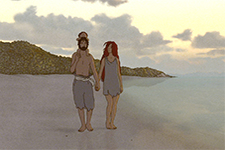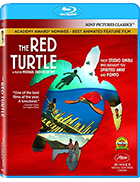The Red Turtle (La tortue rouge)
|  Michael Dudok de Wit’s beautiful, dialogue-free animated fable The Red Turtle (La tortue rouge), which was awarded a Special Jury Prize at last year’s Cannes Film Festival, was also nominated for the Oscar for Best Animated Feature, which eventually went to Disney’s Zootopia. Zootopia’s crowning came as little surprise given that, since the Academy started giving a separate Oscar for animated features in 2001, Disney, Pixar, or DreamWorks films have been awarded 13 of the 16 statues, with two of the remaining three going to Paramount and Warner Bros. releases. The lone standout from the otherwise unbroken string of awards going to major Hollywood productions is Hayao Miyazaki’s Spirited Away (2001), which was produced by Japan’s Studio Ghibli, although it was distributed in the U.S. by—you guessed it—Disney. In other words, it is all too clear that feature animation in the U.S. doesn’t get much attention unless it emerges from one of the “Big Three,” which is a shame because it means that marvelous, but frankly less commercial films like The Red Turtle often end up flying under the radar and not getting the attention they deserve. Dudok de Wit’s film originated with a phone call in 2008 from Studio Ghibli asking for Japanese distribution rights to the Dutch-British animator’s 2000 film Father and Daughter, which won an Oscar for Best Animated Short. The studio also asked to work with him on a feature-length production, and eight years later, Dudok de Wit completed The Red Turtle, his first—but hopefully not his last—animated feature. The entire films takes place on and around a deserted island that is initially inhabited by a nameless man who we first see struggling in the violent ocean swells during a storm. We know—and learn—nothing about this man’s background, including where he’s from and how he ended up stranded in the ocean (we can surmise that he survived a shipwreck, but it really doesn’t matter). The first part of the film concerns his survival on the island as he finds various sources of food, meets the wildlife (including a clattering group of tiny crabs that play as subtle comic relief through most of the film), and attempts to build a raft with which to escape. Yet, every time he builds a raft, something underneath the water batters it and breaks it apart, forcing him to swim back to the island and try again. On the third attempt he sees an enormous red sea turtle floating in the water near him, and he comes to believe that it is this creature responsible for destroying his rafts and keeping him stranded. I won’t give too much away past this point, but suffice it to say that the turtle ends up playing an unexpectedly crucial role in his life, one that leads to companionship from a woman with whom he creates a family in the isolated wilderness, which slowly morphs from a prison to a home. Because there is no dialogue and only a bare minimum of plot development, The Red Turtle has a kind of emotional freedom that makes it significantly more intriguing and emotionally gripping than a lot of desert island stories. There are obvious fantasy elements at work, but these are embedded in the story’s natural ebb and flow with no great effort to explain them. Like the trees on the island that grow fruit, the pools of fresh water at its center, and the ocean itself, the fantasy elements are simply part of the environment, and we come to accept them without a great deal of fuss. One might imagine that Dudok de Wit has allegorical and symbolic intentions, but they are vague enough that they don’t weigh down the experience with heavy import. There is a clear sense of the relationship between humanity and the environment, the latter of which is both violent and threatening (the opening storm is later matched by a brutal tsunami that clears out a significant part of the island’s bamboo forest) and calming and generous. The red turtle of the title appears to be nothing if not a kind of gift from nature to this nameless man, who without it might spend the entirety of his life alone. The Red Turtle is also significant for being a primarily hand-drawn animated film, an artform that is slowly being squeezed out by the siren call of computer animation’s realistic textures, sense of depth, and three-dimensionality. The simplicity of the hand-drawn, black-outlined characters, whose style is immediately reminiscent of the Belgian artist Hergé and his acclaimed Tintin books, is engaging, and Dudok de Wit sets them against an environment that employs some CGI to expand its range and sense of movement while still keeping the overall look and feel of something hand-drawn and painted. The animation is beautiful and elegant and has nothing more than exactly what it needs at any given moment, which makes The Red Turtle into a beautifully moving ode to the rhythms of time and nature and our connection with the worlds we inhabit.
Copyright © 2017 James Kendrick Thoughts? E-mail James Kendrick All images copyright © Sony Pictures Home Entertainment | |||||||||||||||||||||||||||||||
Overall Rating: 


 (3.5)
(3.5)


